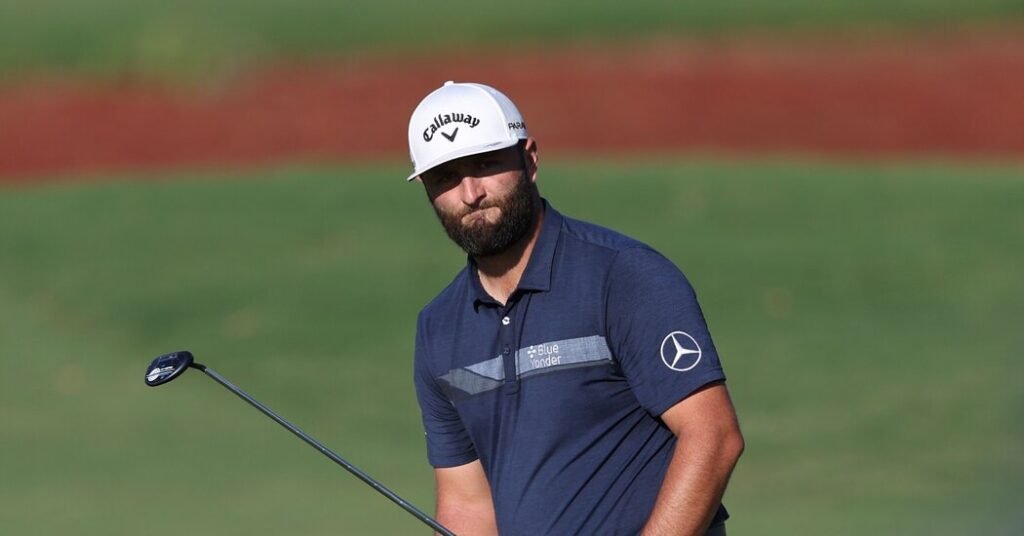The PGA Tour announced Wednesday that it has reached an agreement to raise more than $1.5 billion from a group of U.S. investors, led by Fenway Sports Group, the parent company of the Boston Red Sox and Liverpool Football Club.
The deal will give the PGA Tour a significant amount of cash at a time when it faces stiff competition from its well-funded rival LIV Golf, which is backed by Saudi Arabia’s sovereign wealth fund. The influx of money raises questions about whether a deal the PGA struck six months ago to align itself with the Saudi investment fund remains necessary.
The PGA and the Saudi Arabian fund originally set a deadline of December 31 to work out the details and finalize their deal. That deadline has since been extended and the partnership between the two tours has yet to be completed.
Tour commissioner Jay Monahan said Wednesday on a call with PGA players before the official announcement that the tour “remains in active and frequent dialogue” with representatives of Saudi Arabia’s wealth fund. He added that US investors were “conscious and supportive” of their dealings with the fund. He added that he was in Saudi Arabia a few weeks ago to conduct due diligence on the proposed alliance with executives who support the U.S. investor group.
The Saudi fund, for its part, has made it clear that it will continue to compete with the PGA Tour through LIV Golf if no alliance is struck. In December, the Saudi-backed tour chased Jon Rahm, the third-ranked player in the world.
The tentative deal with American investors is far less likely to draw fire from clubs and Congress than the disastrous deal the PGA Tour struck in June to join forces with the Saudis. That deal, after months of hard-fought competition, drew criticism for Saudi Arabia’s human rights abuses. The deal with Saudi Arabia also lacked important details, almost immediately raising questions about its durability.
Among the American investors joining the Fenway Group are some of the best-known names in sports and finance: Marc Lasry, founder of the hedge fund Avenue Capital and former owner of the Milwaukee Bucks; Tom Ricketts, president of the Chicago Cubs. Steven Cohen, the New York Mets owner through his family office, the Cohen Group. and Gerald Cardinale, founder of investment firm RedBird Capital Partners.
For them, the investment is partly a bet on the renewed enthusiasm for big tech-driven live sports that has led to deals in everything from tennis to cricket. Investors have long believed they could run the PGA Tour more efficiently.
The negotiations presented an unorthodox challenge: Because the PGA Tour has historically been a nonprofit entity, it did not have a traditional ownership structure.
But the tour is setting up a for-profit company to run its commercial operations. The new investors are expected to close with a stake in that venture, which executives have named PGA Tour Enterprises.
PGA Tour Enterprises will now have a 13-person board, seven of whom will be players, Mr. Monahan said on the call. Four members of the US investor group will also join the board, including John Henry, the chief executive of Fenway, and Arthur Blank, the co-founder of Home Depot.
Some players will also receive equity in the new company as part of the deal, potentially easing the furore that followed the secret talks with the Saudis. PGA Tour executives have been trying for months to placate players and even agreed last year to demands that Tiger Woods take a seat on the tour’s board of directors in an effort to limit the power of outside directors.
Mr. Woods spoke on Wednesday’s call with the players, expressing his approval of the deal with the American investors. The call appeared to be an attempt to avoid the frantic manner in which the Tour announced its partnership with the Saudis, an announcement that caught most players by surprise.
“Golf is an amazing sport,” Mr Woods said. “The more we invest in the tour, the more we reap its benefits.”
Despite player equity, star power and fresh money, Saudi Arabia’s sovereign wealth fund continues to outshine the PGA Tour. Even before its 2022 launch, it was a threat to the PGA Tour, using big budgets to chase its stars. The Saudi fund later sued the PGA Tour for what it claimed was anti-competitive behavior, and the PGA Tour fought back and called the tour loyalty an act of patriotism.
Then, surprisingly, the Americans and Saudis sketched out a plan to combine their golf businesses. One of the minimal details of that deal included an agreement by both sides to drop their respective lawsuits.
Soon after, PGA Tour officials went before Congress to explain the deal. Among the questions they faced was why he had not sought other investors. And the Justice Department, which had already scrutinized the PGA Tour for antitrust concerns, prepared to review the deal. The players were almost in revolt.
The tour then began opening talks with US investors – a move that could raise money without political and regulatory scrutiny.

